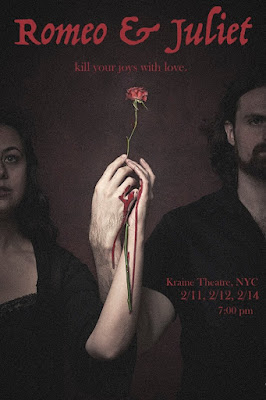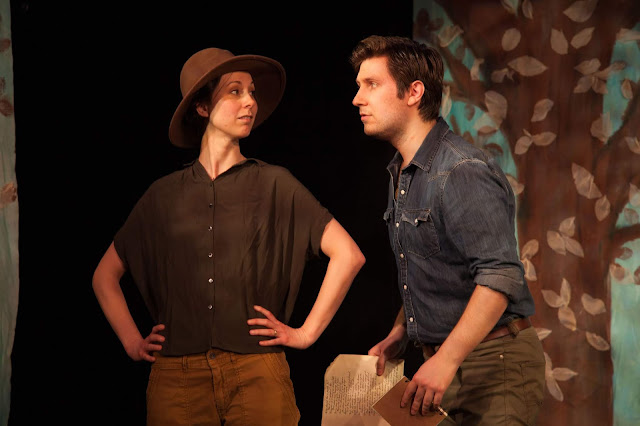HOT TAKE: Romeo and Juliet at the Kraine
Director Drew Bolander takes a romantic look at Shakespeare's classic tale of star-crossed lovers in this limited-run Romeo and Juliet.
 The Well-Done!
The Well-Done!DIRECTING & DRAMATURGY:
This tight cast boasted only eight actors, most of whom pulled double and triple duty, each managing to make their multiple characters unique. Bolander's cut of the play cleverly reassigned some plot elements to accommodate - such as Capulet leaving the note of his party's guests where Romeo can find it, thus eliminating the need for the character of a messenger to do the same. Similarly, there was the use of full-faced masks, available for whenever one of our leads needed to play thumb-biting extras.
For verse enthusiasts, there were several places in the text where cast and director delved into lines that are typically cut in order to give the play new life. Including justifying some obscure lines in the balcony scene, which were delightful. Bolander's directing especially shone in the first half of the play, where he mined the inherent comedy, finding the charm and romance of every scene.
THE CAST:
Cast stand-outs include Laura Iris Hill as the nurse, who manages to make her first speech a firecracker of a stand-up show (no mean feat!), while navigating us successfully to sorrow in the second half of the play. Dylan Riley shines particularly as Friar Lawrence, finding things in the text that no other actor has mined, and delivering all with warmth and humility. Kelsey Hercs delivers a girlish Juliet whose innocence is never cloying, but charming and playful.
Rounding out the cast, Jefferson Reardon as Romeo gave one of the better "banishment" scenes I've seen; Victoria Ratermanis as Mercutio and the Apothecary displayed some lovely physical choices; and Greg Pike's Benvolio was snarky and beleaguered. Robert A.K. Gonyo as Capulet and Anna Savant as Montague and Lady Capulet grounded the cast, lending weight to the impending tragedy as they faced off in Verona streets.
What Could Be Improved:
Romeo and Juliet is in many ways a deceptively simple play. The plot moves along at a dizzying pace, each action colliding into each subsequent consequence until the final double suicide. However, most audiences come for a balcony scene and two deaths - any two deaths - and after the double murders of Tybalt and Mercutio, most productions tend to lose steam. Unfortunately, that was also the case with this production.
Bolander takes a classic romantic view of Shakespeare's story, and as mentioned, does very well with each piece of comedy. Even finding a few funny moments in the second, tragic half of the play. However, for whatever reason, this very romantic view seems to have held him back from fully delving into the darker half of the show. Fights, which were well-choreographed by Jefferson Reardon, were nonetheless far too quick for the violence of Verona to really set in. Most deaths were achieved with a single blow. Similarly, it felt as though Gonyo, playing Capulet, was restraining himself from the true physical threat he could have achieved in his "Hang, starve, die in the streets" scene, which would have motivated Juliet's plight even more.
Of course, there are those who prefer a lighter Romeo and Juliet, to one that gets too dark or gory. Individual audience members' mileage may vary.
The Genius:
Whether you prefer your star-crossed lovers more romantic or more passionate, the audience could clearly agree that Bolander's use of red flower petals in place of blood was spot on. Introduced first, filtering out from Mercutio's wound throughout her speech, through to Romeo coughing up flower petals with his poison, the theatricality worked well. While I should have loved to have had the entire stage covered in flower petals by the end, but production considerations may have precluded that.
Final Verdict:
Bolander and Company seem to specialize in romantic, timeless takes on classical shows, with smart interpretation of obscure texts. There is room to grow into greater artistic boldness and unique theatrical voice, but this Romeo and Juliet is a promising start.


Comments
Post a Comment